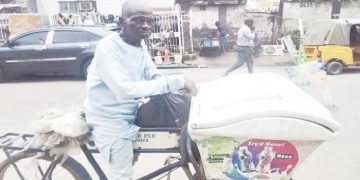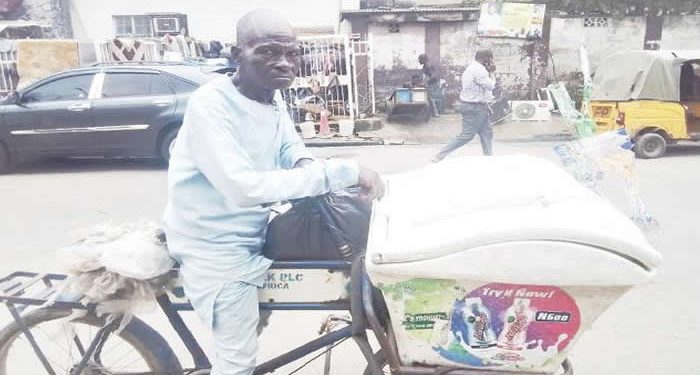For over 50 years, 75-year-old Oladimeji Lawal has pedaled through the streets of Lagos Island, selling ice cream to generations of schoolchildren and residents. Without a pension, retirement benefits, or corporate support, his daily earnings determine his survival.
While many of his peers have long retired, Pa Lawal still mounts his aging bicycle each morning, navigating the bustling city in hopes of selling enough to sustain himself.
A Recognizable Figure in the Community
Though unknown beyond Lagos Island, Lawal is a familiar sight in his neighborhood. Long-time customers often recall buying ice cream from him in their youth and now introduce their children to the same experience.
His story gained widespread attention when a social media user shared a photo of him, revealing that he had been in the business for 57 years. The post went viral, with many expressing admiration and sharing personal memories of their encounters with him, some dating back decades.
After a determined search, a reporter eventually found him on Okesuna Street, gently pedaling his bicycle.
In a calm and nostalgic tone, Lawal—also known as Felele and Pandy Joe—spoke about his long-standing career with pride.
“I have sold ice cream to two or three generations. Some parents who bought from me as children now introduce me to their own kids, telling them I once carried them in my arms,” he said.
How It All Began
Born in Ibadan on July 22, 1950, Lawal attended St. Patrick’s School in Abebi. However, he had to leave after Form 6 to seek work. His journey into the ice cream business began in 1968 when he met a woman named Mrs. Babalola, who needed a bicycle delivery boy.
“She gave me a bicycle to test my riding skills. When I passed, she hired me on commission,” he recalled.
However, an accident while making deliveries left him hospitalized. During his recovery, some of his customers, who only visited Ibadan during holidays, encouraged him to move to Lagos, where business opportunities were better.
“In 1969, I arrived in Lagos with the help of a couple, Mama Yemisi and her husband. They introduced me to an ice cream supplier on Odunlami Street and vouched for me. I worked there for five years until the business closed, then moved on to another supplier in Obalende until 1976,” he recounted.
During that period, selling ice cream was profitable, and he earned up to one pound and ten shillings daily.
A Career That Became a Lifelong Path
Initially, Lawal never intended to sell ice cream for a lifetime.
“When I arrived in Lagos, I was making good money. I even received another job offer with better pay, but I turned it down. I planned to save, buy a car, and start a transport business, but I became attached to this work and never left. The money I earned was enough to sustain me,” he admitted.
However, as the years passed, sales declined, and the job became more demanding.
Reality struck when, in his 50s, a customer casually asked him when he planned to retire.
“That was when it hit me—I had no retirement benefits. My earnings were based on daily sales, not a structured employment system,” he explained.
By 1986, profits had significantly dwindled. He considered becoming a distributor, but the required investment was beyond his reach.
“I would have needed to rent a shop, buy a freezer, and purchase other necessary equipment, but my savings weren’t enough,” he said.
A Devastating Setback
At one point, Lawal had managed to buy half a plot of land in Maroko, hoping to secure his future. He saved diligently, even purchasing a tipper of gravel for N90 to begin construction.
However, in 1990, the government demolished the entire Maroko community, shattering his dream.
“I watched helplessly as my land was taken away. Back then, people didn’t focus on Certificates of Occupancy (CofO). When the government announced that only those with CofOs would be relocated, I realized I had lost everything. If I had already built a house, the loss might have been too much for me to bear,” he recalled.
With his savings wiped out and no alternative, retirement was no longer an option.
Pushing Forward Despite Challenges
Since then, Lawal has continued working, despite the increasing difficulties.
“I sought help, but most promises never materialized. Some of my former customers, including Princess Oyekan and Mama Jide, once raised money to buy me a new bicycle when my old one became unusable. But I never wanted to depend on charity,” he said.
Although some suggested he demand compensation from the ice cream company, he chose not to.
“I told them it wasn’t worth pursuing. I was never directly employed by the company. The only thing they provided was a raincoat during the rainy season, and even that was last given over a decade ago. They used to repair our bicycles, but they stopped,” he explained.
Looking to the Future
Now 75, Lawal still cycles through Lagos Island, though he moves at a slower pace and takes breaks more often. He hopes to establish a small shop where he can sell ice cream and soft drinks without the need to ride long hours.
“I need funds to open a small shop. That way, I can continue selling but won’t have to cycle all day. Maybe just for two hours, especially to schools,” he said.
For over five decades, his daily routine has remained the same.
“I wake up at 8 a.m., collect my supplies by 9 a.m., and cycle through different areas. After school hours, I sell to students. If I have any stock left, I go around the neighborhood before closing by 6 p.m.,” he shared.
A Lifetime Rooted in Lagos Island
Beyond being a place of work, Lagos Island became home for Lawal.
“I met my wife here, and we got married in 1985. She passed away five years ago, but I have another wife in Ibadan. My children support me as much as they can, but I don’t want to burden them. They have their own lives to manage,” he said.
While he sometimes reflects on what could have been, he remains grateful for what he has.
“At least, I am not begging for alms. That alone is something to be thankful for. I have always believed that having a good name is more valuable than wealth. I am contented with what I have,” he concluded.















